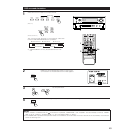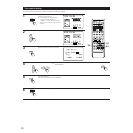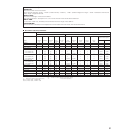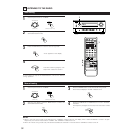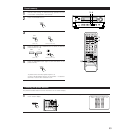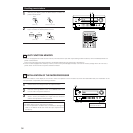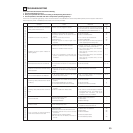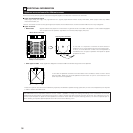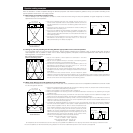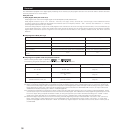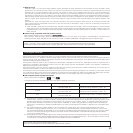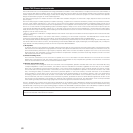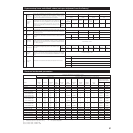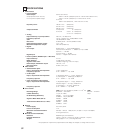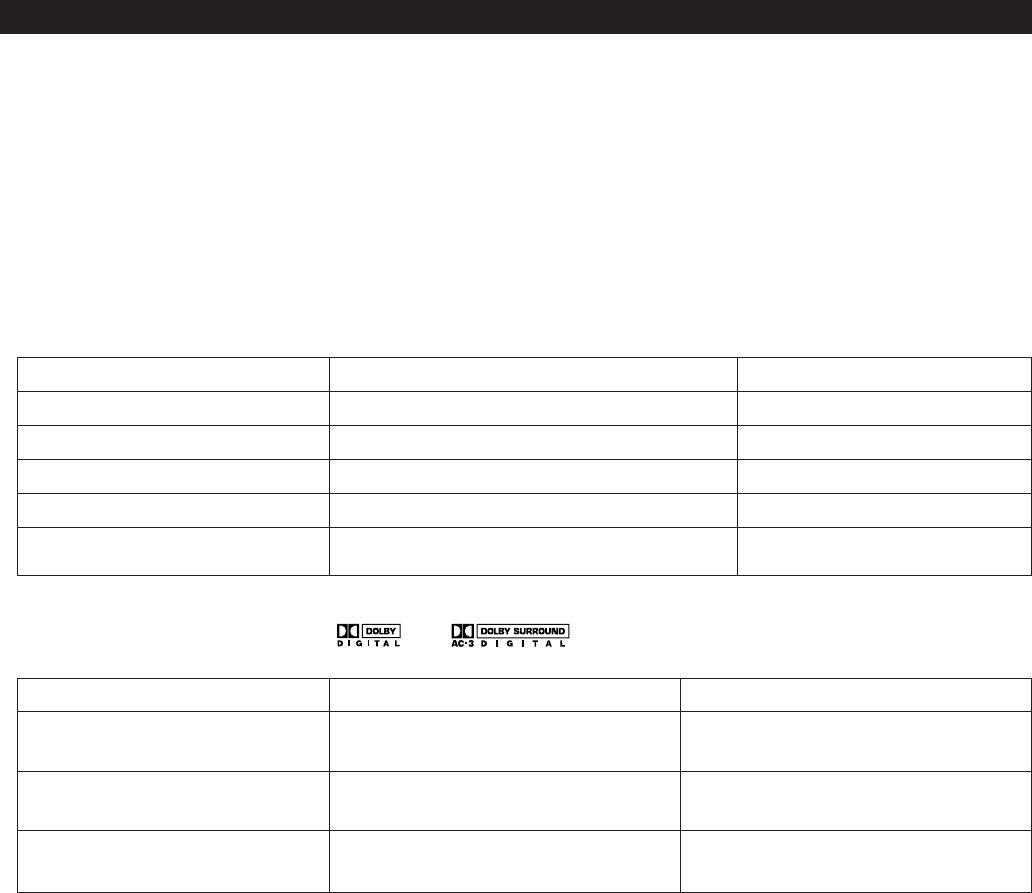
58
Surround
The AVR-5700 is equipped with a digital signal processing circuit that lets you play program sources in the surround mode to achieve the same
sense of presence as in a movie theater.
Dolby Surround
(1) Dolby Digital (Dolby Surround AC-3)
Dolby Digital is the multi-channel digital signal format developed by Dolby Laboratories.
Dolby Digital consists of up to “5.1” channels - front left, front right, center, surround left, surround right, and an additional channel
exclusively reserved for additional deep bass sound effects (the Low Frequency Effects – LFE – channel, also called the “.1” channel,
containing bass frequencies of up to 120 Hz).
Unlike the analog Dolby Pro Logic format, Dolby Digital’s main channels can all contain full range sound information, from the lowest bass, up
to the highest frequencies – 22 kHz. The signals within each channel are distinct from the others, allowing pinpoint sound imaging, and Dolby
Digital offers tremendous dynamic range from the most powerful sound effects to the quietest, softest sounds, free from noise and
distortion.
2 Dolby Digital and Dolby Pro Logic
Comparison of home surround systems
No. recorded channels (elements)
No. playback channels
Playback channels (max.)
Audio processing
High frequency playback limit of surround
channel
Dolby Digital
5.1 ch
5.1 ch
L, R, C, SL, SR, SW
Digital discrete processing Dolby Digital (AC-3) encoding/decoding
20 kHz
Dolby Pro Logic
2 ch
4 ch
L, R, C, S (SW - recommended)
Analog matrix processing Dolby Surround
7 kHz
2 Dolby Digital compatible media and playback methods
Marks indicating Dolby Digital compatibility: and .
The following are general examples. Also refer to the player’s operating instructions.
Media
LD (VDP)
2
1
2
2
2
3
DVD
2
2
Others
(satellite broadcasts, CATV, etc.)
Dolby Digital output jacks
Coaxial Dolby Digital RF output jack
2
1
2
2
2
3
Optical or coaxial digital output
(same as for PCM)
2
4
Optical or coaxial digital output
(same as for PCM)
Playback method (reference page)
Set the input mode to “AUTO” or “RF”.
(Page 37)
Set the input mode to “AUTO” or “DIGITAL”.
(Page 37)
Set the input mode to “AUTO” or “DIGITAL”.
(Page 37)
2
1 When playing in Dolby Digital with a Dolby Digital compatible LD player, connect the LD (VDP) player to the VDP function. (See page 25.)
2
2 When the LD/DVD compatible player is equipped with Dolby Digital RF outputs, the LD’s Dolby Digital output is output from the RF jacks
and the DVD’s Dolby Digital output is output from the optical or coaxial digital jacks. Select the input mode according to the type of media
being played (LD or DVD). Also, if both the RF and Digital outputs are connected to the AVR-5700’s VDP function, the input mode can be
selected automatically by setting the “AUTO” mode (see page 45).
2
3 If the player is switched from the pause or search mode to the play mode when playing an LD in the “AUTO” mode (see page 37), analog
sound may be output momentarily before the sound switches to Dolby Digital. This is because the Dolby Digital RF signals output from the
LD are not output during the pause and search modes, so during this type the input mode is switched according to the “AUTO” mode’s
signal priority order (see page 37). If this happens, switch to the “RF” (fixed RF input) mode. No analog sound will be output.
2
4 Some DVD digital outputs have the function of switching the Dolby Digital signal output method between “bit stream” and “(convert to)
PCM”. When playing in Dolby Digital surround on the AVR-5700, switch the DVD player’s output mode to “bit stream”. In some cases
players are equipped with both “bit stream + PCM” and “PCM only” digital outputs. In this case connect the “bit stream + PCM” jacks to
the AVR-5700.



